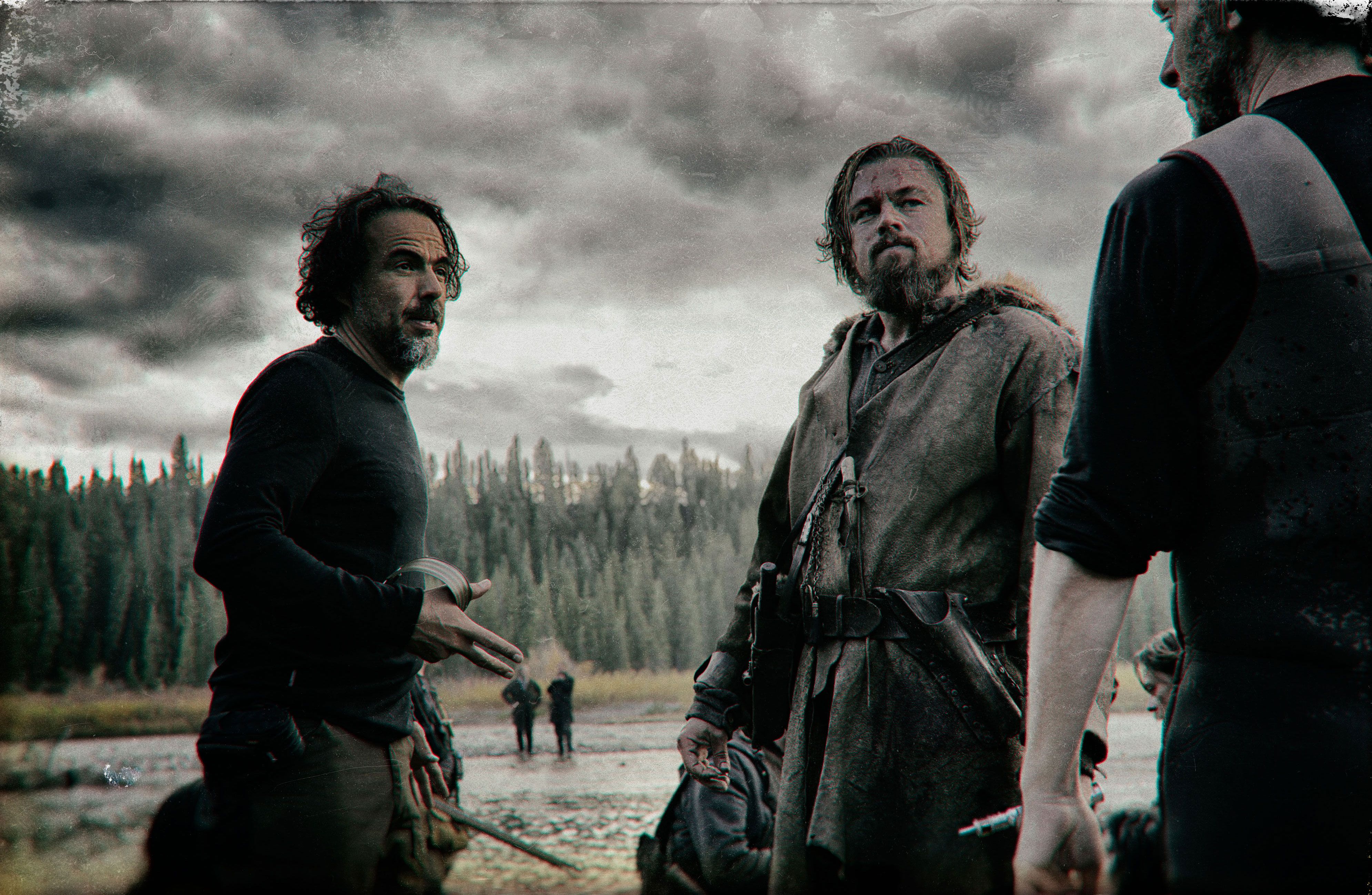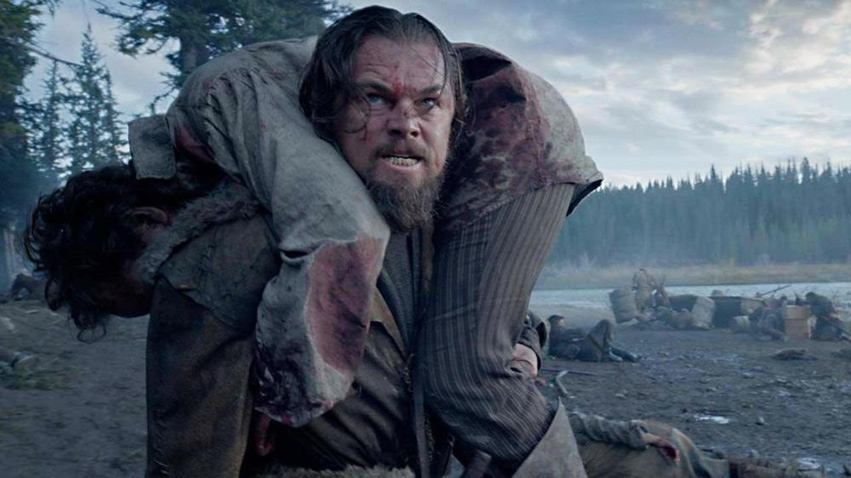 With 2014's Birdman and this year's The Revenant, Alejandro Gonzalez Iñárritu has cemented his place as one of the most bold and enthralling directors working today. Iñárritu is meticulous; each of his visions, going back to Amores Perros, is wound like a clock, moving at just the right pace, designed with the smallest details in mind. His films are usually small, but The Revenant is Iñárritu's $135 million epic - an odyssey of war, survival, and revenge through the hell of the American frontier.
With 2014's Birdman and this year's The Revenant, Alejandro Gonzalez Iñárritu has cemented his place as one of the most bold and enthralling directors working today. Iñárritu is meticulous; each of his visions, going back to Amores Perros, is wound like a clock, moving at just the right pace, designed with the smallest details in mind. His films are usually small, but The Revenant is Iñárritu's $135 million epic - an odyssey of war, survival, and revenge through the hell of the American frontier.
Hugh Glass (Leonardo DiCaprio) is a fur trapper who, after several misfortunes befall him and his men, is betrayed by the greedy Fitzgerald (Tom Hardy) and left for dead, his son Hawk (Forrest Goodluck) brutally murdered. Glass, mortally injured, wrestles against Indians, frontiersmen, and the wilderness in a visceral, blood-soaked struggle for vengeance. All the while, the rest of the men are navigating their way home and a group of Ree Indians search for the chieftain's daughter, kidnapped by "two white men".
In a career that spans twenty-seven years, working with directors like James Cameron, Martin Scorsese, Christopher Nolan, Clint Eastwood, Quentin Tarantino Sam Raimi, and Baz Luhrmann, Leonardo DiCaprio is, and will forevermore be, a titan of cinema. I argue the only reason The Revenant, opening in 3,375 theaters, compared to The Force Awakens' 4,131, opened with only about $3 million less, is because of his namesake. He's the perfect blend of critically, commercially, and publicly acclaimed, and the memes about his ongoing Trix-Rabbit-like hunt for an Oscar say it all - this man deserves recognition in spades. The Revenant is DiCaprio's Raging Bull.
Compared to his recent string of characters - Jordan Belfort, Jay Gatsby, Calvin Candie - DiCaprio doesn't get to exude the sly, fast-talking cockiness he's known for. Hugh Glass is soft-spoken and meek, with a matter-of-fact attitude that stems from vulnerability rather than confidence. He ignores insults, doesn't lash out or retort back, but when he responds, does so in a way and moment where it gives him maximum benefit. Because of one injury, Glass is left mute, so much of the film is told through his face. We see the pain, sorrow, fury, pensiveness - it's all here, and combined with Iñárritu's direction, DiCaprio highlights every emotion precisely, yet fluidly.
Reportedly, DiCaprio learned two native languages (Pawnee and Arikara) and ate a raw bison liver for the role. We've heard similar stories of Method-style actors that get involved to a crazy degree, mainly from Daniel Day-Lewis (My Left Foot) or Adrien Brody (The Pianist). However, the only way that level of preparation works is if the performance benefits, and for The Revenant, god is in the details. It's in the tone and cadence of DiCaprio's voice as Glass speaks to his Pawnee son, that reveal not only a mastery of, but a comfort in the language. It's in the moment DiCaprio, a vegetarian, gags on his first bite of that liver. These small moments add up throughout the film and help us settle into the illusion.
 On the other side is Fitzgerald. The marketing focuses on Glass, but really, The Revenant is a battle, both physically and morally, between these two men. Fitzgerald is a selfish brute, spouting every thought for everyone to hear. It would be easy to dismiss this character as a stereotype of a bumbling, racist frontiersman, but he's just as ambitious and just as cunning. Tom Hardy has always been an actor who completely sells both a hulking presence and and crafty wit, and he does so with aplomb here. Hardy disappears in the role, and if he were to win the Oscar for Best Supporting Actor, it'd make perfect sense.
On the other side is Fitzgerald. The marketing focuses on Glass, but really, The Revenant is a battle, both physically and morally, between these two men. Fitzgerald is a selfish brute, spouting every thought for everyone to hear. It would be easy to dismiss this character as a stereotype of a bumbling, racist frontiersman, but he's just as ambitious and just as cunning. Tom Hardy has always been an actor who completely sells both a hulking presence and and crafty wit, and he does so with aplomb here. Hardy disappears in the role, and if he were to win the Oscar for Best Supporting Actor, it'd make perfect sense.
Through Emmanuel Lubezki's cinematography, The Revenant reminds us of the scope of the world we inhabit. When we see these towering mountains, or vast, untouched landscapes with a speck at the bottom that's supposed to be Glass and his horse, the film puts into perspective how fragile we are. These moments often serve as jaw-droppers, where we look at Glass and silently praise him for his tenacity. I also see moments where the characters impact the landscape just as much; Fitzgerald fires a gun, and minutes later, the shot triggers an avalanche. In a sense, the wilderness is an extension of the drama between our two leads, serving to heighten the suspense and the madness of it all.
It's ironic the two films I was most looking forward to in the beginning of 2016 was this and The Hateful Eight, because I find them opposites in reference to morality and justice. Where Hateful Eight is brutal and claustrophobic, I find The Revenant, for all of DiCaprio's foaming at the mouth and near-bleeding to death, hopeful and full of faith. The Hateful Eight points out hypocrisies of law enforcers who deem themselves detached from the moral consequences of murder under the guise of legality. Eventually, the characters succumb to a more emotionally-driven form of justice, where the oppressed strikes against the oppressor, and this instinctual justice feels right in the end. The Revenant doesn't believe its world to be as cynical; Iñárritu uses spirituality - a dream sequence in an abandoned church and a conversation with a Pawnee Indian where the Indian tells Glass, "revenge is in the Creator's hands" - to suggest an overarching moral enforcer, one that doesn't depend on the loose emotions of humanity, but also one that punishes the oppressors. Unlike The Hateful Eight, a trial won't serve someone like Fitzgerald well.
 Glass crawls on his belly, writhing and moaning, jutting his jaw out like a bear, and as the movie develops, we see an evolution in not only his physical presence, but in his heart. He embraces this spiritual connection, going from a beast driven by rage to a man in connection with nature and the overarching guidance of the world. This transformation is painful to watch, and as I sat, my audience winced and groaned more than a few times; I joined along. The landscape starts as an impossible adversary, but as the movie progresses, he begins to see it as an ally, a teacher, perhaps a God?
Glass crawls on his belly, writhing and moaning, jutting his jaw out like a bear, and as the movie develops, we see an evolution in not only his physical presence, but in his heart. He embraces this spiritual connection, going from a beast driven by rage to a man in connection with nature and the overarching guidance of the world. This transformation is painful to watch, and as I sat, my audience winced and groaned more than a few times; I joined along. The landscape starts as an impossible adversary, but as the movie progresses, he begins to see it as an ally, a teacher, perhaps a God?
The Revenant is not an easy film to stomach, what with the violence and gore, but in the end, I found it hopeful, a shining beacon for a spiritual betterment in us. DiCaprio is the frontrunner for the Oscar this year, but with performances like this, he's too good for the Academy. Hardy is brilliant; there are wonderful supporting performances from Domnhall Gleeson and Will Poulter. Lubezki captures imagery that demands a theater seat, and Iñárritu wrangles them all together for an experience unlike many you'll see, not only this year, but this decade.
Thank you all for reading; I'm the Man Without a Plan, signing off.


No comments:
Post a Comment